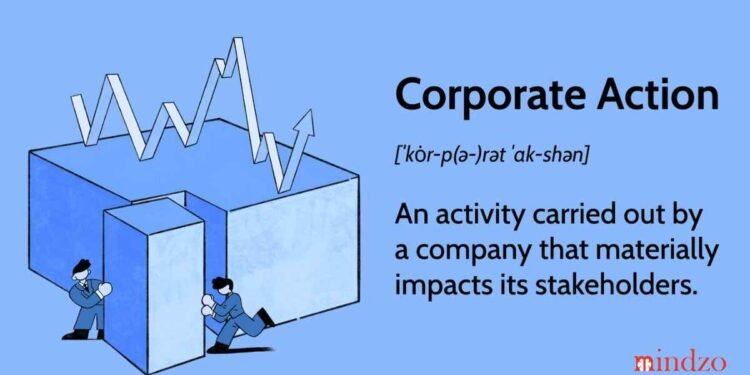What Are Corporate Actions?
What are Corporate Actions? How Do They Influence Traders? Corporate actions are decisions made by a company’s board of directors that have an impact on shareholders and stock prices. These actions can be anything from issuing dividends to merging with another company. Understanding them is crucial for traders, as they can influence investment strategies and market movements.
Types of Corporate Actions
Corporate actions generally fall into three categories:
- Mandatory – Actions that shareholders must comply with.
- Voluntary – Actions where shareholders have the choice to participate.
- Mandatory with options – Actions that are compulsory but offer choices to shareholders.
Mandatory vs. Voluntary Corporate Actions
A mandatory corporate action occurs without requiring shareholder approval. Examples include stock splits and mergers. In contrast, a voluntary corporate action allows shareholders to decide, such as buybacks or rights issues.
Stock Splits and Reverse Splits
Stock splits occur when a company increases its number of shares while decreasing its share price proportionally. For example, in a 2-for-1 split, a $100 stock would become two $50 stocks. A reverse split is the opposite, reducing the number of shares and increasing the price per share.
Dividends: Cash and Stock
Companies reward shareholders by paying dividends—either in cash or stock. Cash dividends provide direct income, while stock dividends give additional shares, potentially increasing long-term value.
Mergers and Acquisitions (M&A)
When companies merge or acquire others, stock prices often fluctuate. Shareholders may receive new shares or cash payouts, impacting their investment portfolios.
Spin-Offs and Demergers
Sometimes, a company splits a part of itself into a new, independent entity. This can unlock shareholder value as investors gain shares in both companies.
Bonus Shares and Rights Issues
Bonus shares are additional shares given for free, while rights issues allow shareholders to buy new shares at a discounted price.
Buybacks and Their Effects on Traders
In a buyback, a company repurchases its shares, reducing supply and potentially increasing share value. This can be beneficial for long-term shareholders.
Corporate Actions and Market Sentiment
Traders react to corporate actions based on perceived company health. Positive actions like dividends can boost confidence, while negative actions like delistings can hurt stock prices.
How Traders Can Benefit from Corporate Actions
Savvy traders analyze corporate actions to predict price movements. For instance, knowing about an upcoming dividend can influence short-term trading strategies.
Potential Risks Associated with Corporate Actions
Not all corporate actions benefit shareholders. A poorly executed merger can lead to losses, and reverse splits can indicate financial trouble.
How to Stay Updated on Corporate Actions?
Traders should monitor company announcements, financial news, and stock exchange notifications to stay informed about upcoming corporate actions.
Case Studies of Significant Corporate Actions
Examining real-world examples, such as Apple’s stock splits or Tesla’s share buybacks, can provide insights into how corporate actions influence stock prices.
Conclusion
What are Corporate Actions? How Do They Influence Traders? Corporate actions play a crucial role in the stock market, impacting both short-term traders and long-term investors. By understanding these actions, traders can make informed decisions and potentially capitalize on market changes.
FAQs
1. What are the most common corporate actions?
The most common corporate actions include stock splits, dividends, mergers, acquisitions, and buybacks.
2. How do corporate actions affect stock prices?
Corporate actions can cause stock prices to rise or fall based on investor perception and market demand. For example, dividends often attract investors, raising stock value.
3. Should traders always act on corporate actions?
Not necessarily. While some corporate actions present opportunities, others might pose risks. Traders should analyze the impact before making decisions.
4. Can corporate actions be bad for shareholders?
Yes. Some corporate actions, like reverse splits or forced acquisitions, may not benefit shareholders and could lead to losses.
5. Where can traders find information about corporate actions?
Traders can check company announcements, stock exchange websites, and financial news platforms to stay informed about corporate actions.




















